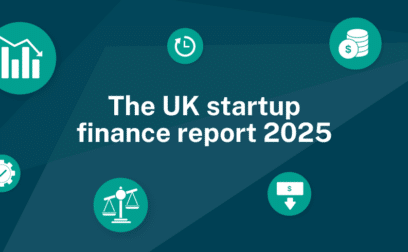The UK’s demand for new homes, commercial buildings and infrastructure upgrades is higher than ever – which is good news for anyone who wants to start a construction business. But how do you begin? What are the essential actions to take and the common mistakes to avoid? Read on to find out more.
Start a construction business: Step by step
Starting a construction business requires strategic planning, industry knowledge, and a strong foundation in legal and financial aspects. From obtaining necessary licences, to hiring skilled labour, sourcing reliable suppliers and acquiring essential equipment, entrepreneurs need to overcome many hurdles to establish a reputable construction company.
1) What area of construction will you focus on?
The UK construction industry is deep and varied, with most construction companies concentrating on a specific sector or a niche within a sector. Before you begin to build your business, do your homework to determine which area of the industry will work best for you.
Common construction sectors include:
Residential buildings
This means homes for people to live in – usually houses or apartment blocks. Large scale developers often build clusters of houses or estates, sometimes with hundreds or even a few thousand homes incorporated into the project. Small to medium-sized construction companies will typically build just a few homes at a time, or even one home at a time, as the resources to build large numbers of dwellings simultaneously will be beyond their scope of operation.
Top tip: The UK Government has committed to a plan to build 1.5 million new homes by 2029. This may create fresh opportunities for new residential construction businesses.
Infrastructure
Infrastructure projects include roadways, railways, bridges, utility plants, communication systems and transport and logistics hubs. Many of these projects are controlled by local or central government – clients that typically prefer to work with a small portfolio of vetted and proven suppliers – so it may be difficult for a new and growing construction business to secure such a project. However, you may be able to secure part of a project as a sub-contractor, for instance, building storage sheds within a new port facility.
Top tip: You can search for government and public construction projects available for tender on government sites such as contract finder or on various commercial platforms.
Industrial and Commercial
This means business property – factories, warehouses, shops, office blocks, etc. The size and value of construction projects within this sector can vary enormously, from building a complete factory to refurbishing a small high-street shop. As a new business, you’ll focus on smaller projects to begin with, perhaps subcontracting work from large developers or by soliciting businesses that are seeking to expand or upgrade their facilities. If your financial resources are large enough, you could also buy land to construct industrial and commercial properties on spec.
Identifying your niche
As said above, identifying your niche is essential before you begin to build your business. Different areas of the industry will require different marketing and financing strategies as well as placing different demands on your resources. Ideally, you should select a niche where you have previous experience or where you have contacts that may give you access to new projects. Gaining a reputation for value, knowledge and quality within your chosen niche is key to success.
2) Research your local market
Most small to medium-sized construction companies work within their local market, preferring to leave the national projects to the major players. You’ll need to learn where demand is, what is happening within the industry in your local area and discover the resources you’ll need to make your business tick. Things to look out for include:
- Who are your competitors? What type of projects do they deliver? Is there scope for a new business – your business – to capture some of those projects?
- If you’re building new homes, are there sufficient customers in your area? What can they afford? Would it make sense to build first-time buyer flats or to build houses for higher income buyers?
- What is the spare capacity of skilled labour in your area? Can you secure the workers you’ll need and what will they cost?
- What advance planning for major projects is there? This means business parks, freeports, train stations (HS2) etc – projects that will have a knock-on effect in demand for homes, warehousing, retail units and more.
- How active is the local refurbishment and home conversion market? Could you build a business renovating old houses or turning larger properties into flats?
How to do construction market research
There are many ways to conduct marketing research:
- Google search
- Construction industry reports
- Builder’s websites
- Commercial directories
- Industry magazines
- Government reports
- Historical data and bids
- Proposed projects coming into the area
Customer feedback is also a good way to learn more about your local customer base. Surveys, questionnaires, focus groups or face-to-face interviews can tell you how often they’ve used a builder.
What were their biggest issues with the building process? What is the most important factor that makes them a happy customer?
3) Draft a business plan
If you’re seeking external investment or a commercial business loan to start your construction business, you’ll need a detailed business plan to support your pitch or application. Investors and lenders will want to know why you need their funds and what the money will do for your new organisation. Business plans should do more than paint a rosy picture – explain the risks involved, what the downsides could be – and how you intend to overcome them.
Your plan should detail the following important information:
- Your business and management structure
- The services you’ll provide
- What kind of projects you’ll bid on
- Your target market – who are your key customers
- Your marketing plan
- Number of employees
- Estimated startup costs
- Estimated income for your first year and the KPI’s you need to achieve to reach it
- Whether you will be a cash or accrual business and what your billing terms are
- Who your lending sources are
Even if you don’t need investment or a loan, a business plan can still be a very useful vital tool. Use it as your business manual, referring to the contents to guide your strategy and manage your financials.
Find out more about creating your business plan here.
4) Register your business
You’ll need to register your business and apply for VAT registration with HMRC. You may also need special permits and licences depending on the type of work you’ll carry out.
5) Buy insurance
The construction industry is risky, and accidents and loss are common. You’ll need to protect yourself, your workers and your business with adequate business insurance. Here are the key policies you’ll need:
Employers liability
Under the Employers Liability Act of 1969, employers’ liability insurance (ELI) is a legal requirement for most UK employers. ELI protects you and your employees, (including those who no longer work for you), should they be injured or become unwell as a result of working for your business. ELI typically covers the associated legal and compensation costs, and other damages of such events, but it can also cover accidental injury or damages caused by an employee to a third party, like your customers.
Important Note: Employers liability insurance is mandatory by law for almost all employers. Your policy must cover you for at least £5 million and come from an authorised insurer. Your business can be fined up to £2,500 for every day you are not properly insured.
Public liability
Public liability insurance protects your business if someone is injured, or their property is damaged because of the services that you or your business provides. This type of cover, also known as PL or liability insurance, is designed to protect your business against third party claims for injuries or property damage from a customer or client, passer-by, or a visitor to your business premises – whether you’re at fault or not.
Tool insurance
Tool insurance, also known as portable equipment cover, protects the machinery and equipment you take from job to job. This includes things like hand and machine tools, generators, lighting rigs, tech devices, ladders, and testing equipment. The portable nature of these essential items makes them more prone to loss, theft, damage, and accident, and their replacement can often be expensive.
6) Obtain funding
Even if you’re starting off very small, you’ll probably need funding to make your business grow and to meet the high cash flow pressures of the UK construction industry. You can look for funding from investors or friends and family, or you can seek a low-cost small business loan.
It is important to understand that business loans are often custom deals, shaped to fit your business, which means no two loan deals look alike. It can also be challenging to get a loan when your business is very new. This means you’ll need to shop around to find a lender who can help. You can do this by approaching banks and online lenders one by one over weeks or even months, or you can use the services of a loan marketplace that will immediately introduce you to a choice of business loans from a range of lenders. Some marketplace platforms can also give you advice and help you with the application process. This can be especially useful for borrowers who have never taken out a business loan before.
Popular business loans for construction companies:
- Term loan: This is a lump sum that you pay back over time. Borrow up to £5million over as long as 25 years. Collateral may be required.
- Business line of credit: Also known as a revolving credit facility, this is a loan that functions like a high-value credit card. Withdraw cash anytime up to the maximum of your credit limit. You only pay interest on the sum you withdraw, not the whole line. This can significantly reduce your borrowing costs. Collateral may be required.
- Equipment finance: An equipment loan or lease can help you buy the expensive construction equipment you need. Use the machinery as you pay for it. With a loan you’ll own the machinery outright at the end of the contract. With a lease , which is a long-term rental agreement, you may have the option to buy the equipment for a peppercorn sum or the residual value of the machinery when the contract ends. No collateral required.
- Invoice finance: Also known as account receivables financing, this type of loan allows you to borrow against the value of your unpaid invoices and it can be a solid option for construction businesses that lack other forms of collateral. Instead of waiting 30, 60, or 90 days or more to get paid, the lender may provide up to 95% of your invoice value within a few days or even hours of the bill being raised. Your invoices act as security for the loan, no added collateral is required.
- Construction loan: Use a construction loan to cover the cost or new-builds or the redevelopment or refurbishment of an existing property.
How Swoop can help
No matter if you’re seeking a low-cost business loan or comprehensive insurance to protect your construction business, working with experts can make all the difference when applying for funding or buying a new policy. Contact Swoop to discuss your borrowing and insurance needs and to compare high quality business loans and insurance from a choice of providers. Get your new construction business firmly off the ground. Register with Swoop today.








































 yet? Register here!
yet? Register here!